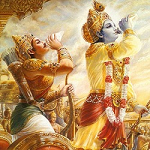
Capturas de pantalla:
Descripción
Read the Bhagavad Gita - arranged by Chapter/ Slokas.
The Bhagavad Gita (or the Song of God) is a Hindu scripture produced from the colloquy given by Sri Krishna to Arjuna during the Kurukshetra War. Its philosophies and insights are intended to reach beyond the scope of religion and to humanity as a whole. It is at times referred to as the "manual for mankind" and has been highly praised by not only prominent Indians such as MK Gandhi but also Aldous Huxley, Albert Einstein, Robert Oppenheimer, Ralph Waldo Emerson, Carl Jung and many others. It is considered among the most important texts in the history of literature and philosophy. The Gita comprises exactly 700 verses, and is a part of the Mahabharata. The teacher of the Bhagavad Gita is Lord Krishna, who is revered by Hindus as a manifestation of God Himself.
The context of the Gita is a conversation between Lord Krishna and the Pandava prince Arjuna taking place on the battlefield before the start of the Kurukshetra War. Responding to Arjuna's confusion and moral dilemma about fighting his own cousins, Lord Krishna explains to Arjuna his duties as a warrior and prince, and elaborates on different Yogic and Vedantic philosophies. During the discourse, Lord Krishna reveals His identity as the Supreme Being Himself, blessing Arjuna with an awe-inspiring vision of His divine universal form.
The main philosophical subject of the Bhagavad Gita is the explanation of five basic concepts or "truths": * Ishvara (The Supreme Controller) * Jiva (Living beings/the individualized soul) * Prakrti (Nature/Matter) * Dharma (Duty in accordance with Divine law) * Kaala (Time)

